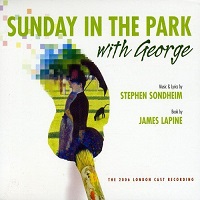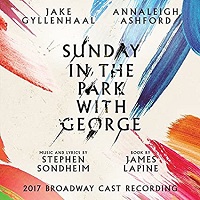 Original Broadway Cast, 1984 (RCA)
Original Broadway Cast, 1984 (RCA)  (4 / 5) Few Broadway composers could successfully make a painting into a musical, but Stephen Sondheim turned Georges Seurat’s “A Sunday Afternoon on the Island of la Grande Jatte” into one of his most unforgettable and distinctive works. In essence, Sunday in the Park With George is a meditation on the nature of art as viewed in the past (Seurat in the first act) and the present (his descendant, named George, in the second). Although the show has been criticized for the disparity in style between its two acts, each informs the other to create a cohesive whole, and the score has real depth and color. Sondheim reflects Seurat’s unique painting style through the use of staccato notes, playing with the various hues of music much as the artist worked with pigments. Songs such as “Color and Light” and “Finishing the Hat” are particularly remarkable in sound and texture. A few of the compositions are slightly more conventional: “We Do Not Belong Together,” the aching cry of Seurat’s mistress, Dot; the beautiful “Beautiful,” for Georges and his mother; and the rapturous Act I finale “Sunday,” during which the painting finally comes to life. The second act begins with the amusing “It’s Hot Up Here,” sung by the characters in the painting, followed by the brilliant musical scene “Putting It Together” (about George’s fundraising attempts), “Children and Art” (about what we leave behind when we die), and “Lesson #8” (about the constantly mutating nature of art and life). As Georges/George and Dot/Marie, Mandy Patinkin and Bernadette Peters do some of the finest work of their careers, leading an excellent company through the score’s intricacies. Sunday is one of Sondheim’s finest achievements, though it may require several hearings to be fully appreciated. — Matthew Murray
(4 / 5) Few Broadway composers could successfully make a painting into a musical, but Stephen Sondheim turned Georges Seurat’s “A Sunday Afternoon on the Island of la Grande Jatte” into one of his most unforgettable and distinctive works. In essence, Sunday in the Park With George is a meditation on the nature of art as viewed in the past (Seurat in the first act) and the present (his descendant, named George, in the second). Although the show has been criticized for the disparity in style between its two acts, each informs the other to create a cohesive whole, and the score has real depth and color. Sondheim reflects Seurat’s unique painting style through the use of staccato notes, playing with the various hues of music much as the artist worked with pigments. Songs such as “Color and Light” and “Finishing the Hat” are particularly remarkable in sound and texture. A few of the compositions are slightly more conventional: “We Do Not Belong Together,” the aching cry of Seurat’s mistress, Dot; the beautiful “Beautiful,” for Georges and his mother; and the rapturous Act I finale “Sunday,” during which the painting finally comes to life. The second act begins with the amusing “It’s Hot Up Here,” sung by the characters in the painting, followed by the brilliant musical scene “Putting It Together” (about George’s fundraising attempts), “Children and Art” (about what we leave behind when we die), and “Lesson #8” (about the constantly mutating nature of art and life). As Georges/George and Dot/Marie, Mandy Patinkin and Bernadette Peters do some of the finest work of their careers, leading an excellent company through the score’s intricacies. Sunday is one of Sondheim’s finest achievements, though it may require several hearings to be fully appreciated. — Matthew Murray
 London Cast, 2006 (PS Classics, 2CDs)
London Cast, 2006 (PS Classics, 2CDs)  (1 / 5) This recording showcases compelling, committed vocal performances by Daniel Evans and Jenna Russell as George and Dot/Marie, though their Brit accents — his pretty much RP, hers more North London — may take some getting used to. But for many listeners, the extreme diminution of the size of the orchestra here as compared to the forces heard on the original Broadway cast album will be reason enough to exclude it from their collections. The original justification for the pathetically meager instrumentation was that this production was staged at the intimate Menier Chocolate Factory, but there was no significant increase in the number of musicians for the cast album (as often happens) or when the show transferred to Broadway under the auspices of the Roundabout Theatre Company, which presented it in the large Studio 54 venue. On the recording, this is a greater liability in some songs (e.g., “Sunday”) than others, but the tiny orchestra — or, rather, small combo or chamber ensemble — is a major disappointment throughout. The production itself was enjoyable for the leads and for a wonderfully creative use of projections to display Georges Seurat’s art, but minus the visuals, the cast album doesn’t really justify its existence. — Michael Portantiere
(1 / 5) This recording showcases compelling, committed vocal performances by Daniel Evans and Jenna Russell as George and Dot/Marie, though their Brit accents — his pretty much RP, hers more North London — may take some getting used to. But for many listeners, the extreme diminution of the size of the orchestra here as compared to the forces heard on the original Broadway cast album will be reason enough to exclude it from their collections. The original justification for the pathetically meager instrumentation was that this production was staged at the intimate Menier Chocolate Factory, but there was no significant increase in the number of musicians for the cast album (as often happens) or when the show transferred to Broadway under the auspices of the Roundabout Theatre Company, which presented it in the large Studio 54 venue. On the recording, this is a greater liability in some songs (e.g., “Sunday”) than others, but the tiny orchestra — or, rather, small combo or chamber ensemble — is a major disappointment throughout. The production itself was enjoyable for the leads and for a wonderfully creative use of projections to display Georges Seurat’s art, but minus the visuals, the cast album doesn’t really justify its existence. — Michael Portantiere
 Broadway Cast, 2017 (Arts Music, 2CDs)
Broadway Cast, 2017 (Arts Music, 2CDs)  (3 / 5) Jake Gyllenhaal made his name as a movie actor, and became a star in that sphere in such movies as Donnie Darko, Prisoners, Brokeback Mountain, and Nightcrawler before he tackled musical theater in the rapturously received 2015 presentation of Menken and Ashman’s Little Shop of Horrors at New York City Center, following up that success with the equally acclaimed 2017 Broadway revival of Sondheim and Lapine’s Sunday in the Park With George. On the cast album belatedly yielded by the latter production, Gyllenhaal’s vocal acting is of a very high level, and he brings to the role of George a youthful quality and an underlying charm that go a long way toward making an often exasperating character sympathetic. But it must be said that, while his vocal tone is very pleasing, Gyllenhaal has a disconcerting tendency to sing off pitch on sustained notes — sometimes in straight tone, sometimes with a vibrato that turns into more of a wobble. No such issues are present in the singing of Annaleigh Ashford as Dot/Marie; her voice is clear as a bell and rock-solid in pitch, and her performance bursts with personality. The album also features stellar if brief contributions from an A-list supporting cast including Brooks Ashmanskas, Jenni Barber, Phillip Boykin, Erin Davie, Penny Fuller, Robert Sean Leonard, Liz McCartney, Michael McElroy, Ruthie Ann Miles, Ashley Park, and David Turner. The inclusion of quite a bit of spoken dialogue from James Lapine’s often stilted, problematic book for the show on this 2-CD set might be considered a mark against it, especially when you repeatedly listen to all of those lines in which, for some annoying reason, the characters completely eschew the natural use of contractions — e.g., “I guess I did not learn it soon enough….Sometimes he will work all night long.” But of course, any cast album of a Stephen Sondheim show is all about the score, and this one has many pleasures to offer despite the caveats noted. — M.P.
(3 / 5) Jake Gyllenhaal made his name as a movie actor, and became a star in that sphere in such movies as Donnie Darko, Prisoners, Brokeback Mountain, and Nightcrawler before he tackled musical theater in the rapturously received 2015 presentation of Menken and Ashman’s Little Shop of Horrors at New York City Center, following up that success with the equally acclaimed 2017 Broadway revival of Sondheim and Lapine’s Sunday in the Park With George. On the cast album belatedly yielded by the latter production, Gyllenhaal’s vocal acting is of a very high level, and he brings to the role of George a youthful quality and an underlying charm that go a long way toward making an often exasperating character sympathetic. But it must be said that, while his vocal tone is very pleasing, Gyllenhaal has a disconcerting tendency to sing off pitch on sustained notes — sometimes in straight tone, sometimes with a vibrato that turns into more of a wobble. No such issues are present in the singing of Annaleigh Ashford as Dot/Marie; her voice is clear as a bell and rock-solid in pitch, and her performance bursts with personality. The album also features stellar if brief contributions from an A-list supporting cast including Brooks Ashmanskas, Jenni Barber, Phillip Boykin, Erin Davie, Penny Fuller, Robert Sean Leonard, Liz McCartney, Michael McElroy, Ruthie Ann Miles, Ashley Park, and David Turner. The inclusion of quite a bit of spoken dialogue from James Lapine’s often stilted, problematic book for the show on this 2-CD set might be considered a mark against it, especially when you repeatedly listen to all of those lines in which, for some annoying reason, the characters completely eschew the natural use of contractions — e.g., “I guess I did not learn it soon enough….Sometimes he will work all night long.” But of course, any cast album of a Stephen Sondheim show is all about the score, and this one has many pleasures to offer despite the caveats noted. — M.P.

